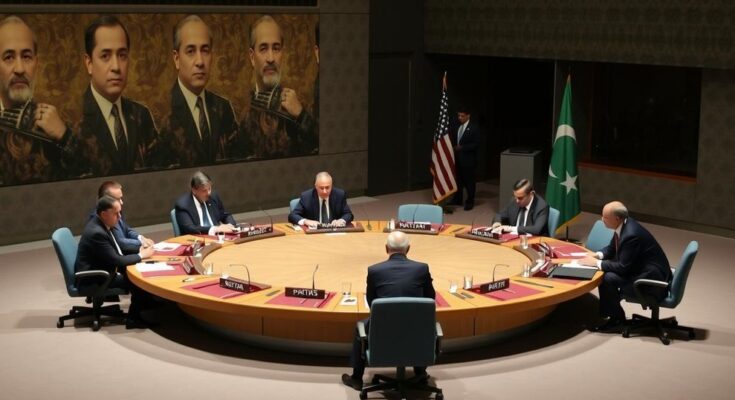Pakistan commenced its two-year term as a non-permanent member of the UN Security Council (UNSC) on January 1, 2025, after securing 182 votes. This marks the country’s eighth term, during which it will preside over the council in July 2025 and focus on global peace initiatives, terrorism, and regional issues like the Kashmir dispute. Ambassador Munir Akram highlighted Pakistan’s commitment to an active role in addressing geopolitical challenges.
On January 1, 2025, Pakistan officially began its two-year term as a non-permanent member of the United Nations Security Council (UNSC), marking its eighth tenure on this prestigious council. Succeeding Japan as the representative from Asia, Ambassador Munir Akram reaffirmed Pakistan’s commitment to engaging actively and constructively in addressing pressing global issues. Pakistan secured its position with 182 votes from the 193-member General Assembly, exceeding the necessary two-thirds majority, a testament to its diplomatic efforts and international support.
During its term from January 1, 2025, to December 31, 2026, Pakistan will assume the presidency of the UNSC in July 2025, where it will set the agenda for the council and lead discussions on critical matters. Notably, Pakistan will participate in the Islamic State (ISIS) and Al Qaeda Sanctions Committee, tasked with designating terrorist entities and enforcing related sanctions. This involvement underscores Pakistan’s approach to enhancing global security and counterterrorism efforts.
Pakistan has a historical presence in the UNSC, previously serving during various terms, including 2012-2013, 2003-2004, and as far back as 1952-1953. Ambassador Akram pointed out the current geopolitical challenges such as increasing competition between major powers, strife in Europe, the Middle East, and Africa, and an escalating arms race. He articulated Pakistan’s intention to promote peace, resolve international disputes, and staunchly combat terrorism during this tenure.
Moreover, significant regional subjects warrant attention during Pakistan’s term, including the ongoing Kashmir dispute and political instability in Central and West Asia. Ambassador Akram maintained that Pakistan is dedicated to highlighting the Kashmir issue and advocating for decisive action from the global community to address this long-standing concern.
Pakistan’s entry into the UNSC as a non-permanent member is a critical development in international diplomacy, enhancing its role in shaping global security policies. The UNSC consists of 15 members, among which five are permanent with veto power, while the rest are elected for two-year terms. Pakistan’s historical engagements in the UNSC reflect its enduring commitment to addressing complex international crises, promoting peace, and advocating for regions facing conflicts, most notably the Kashmir dispute. The country’s strategic geopolitical position further underscores the significance of its involvement in shaping discussions on security and terrorism.
In summary, Pakistan’s two-year term as a non-permanent member of the UNSC marks an important opportunity to advance its global diplomatic objectives, especially in promoting peace and addressing terrorism. The forthcoming presidency in July 2025, coupled with its engagement in the ISIS and Al Qaeda Sanctions Committee, positions Pakistan to take a proactive role in navigating complex international dynamics. Through its active participation, Pakistan seeks to raise pressing issues, particularly the Kashmir conflict, and to contribute meaningfully to international security and cooperative governance.
Original Source: currentaffairs.adda247.com




